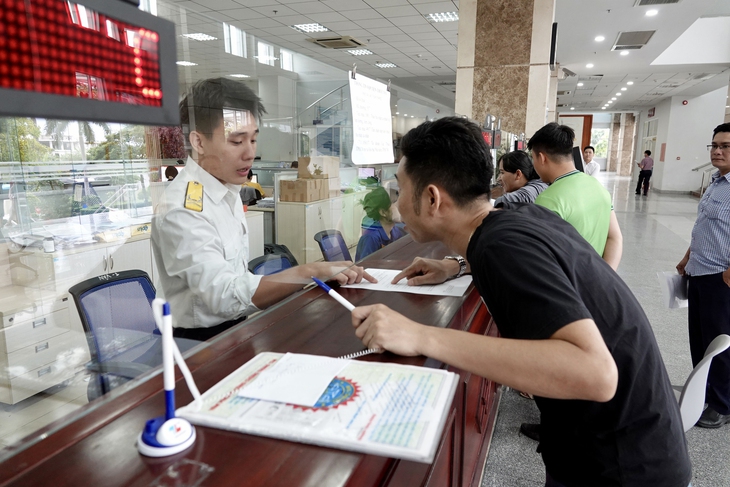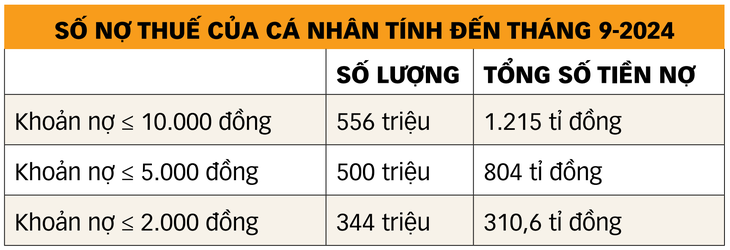
People do tax procedures at the Ho Chi Minh City Tax Department on the afternoon of March 11 - Photo: TTD
The tax industry is proposing to erase these debts to reduce management pressure and optimize resources.
Experts also recommended raising the tax exemption threshold for personal debts to VND100,000 instead of VND50,000 as proposed by the Ministry of Finance .
Tax debt is only equal to a package of sticky rice or a glass of iced tea.
According to statistics from the Ministry of Finance, of more than 1.4 billion tax debts from 2,000 to 10,000 VND, there are 344 million debts under 2,000 VND, 500 million debts under 5,000 VND and 556.3 million debts under 10,000 VND.
It is worth mentioning that the majority of these debts are late payment penalties. Specifically, just counting the debt of about 10,000 VND, 80% are late payment penalties.
To manage this type of debt, the tax authority said it had to invest in costs for maintaining, operating and administering the system, storage costs on tax management systems to process, calculate late payment fees, send debt notices and tax notices... to taxpayers, not to mention the social costs incurred for taxpayers and tax collection coordination units.
Mr. Nguyen Van Duoc - General Director of Trong Tin Accounting and Tax Consulting Company Limited - said that there are many reasons for the occurrence of these small debts. Among them, many small tax debts arise because businesses and individuals pay taxes according to the notice without calculating the additional amount incurred on the actual payment date.
Another reason is that currently the tax authority tracks the amount of tax paid by chapter and sub-section, leading to cases where businesses sometimes mistake chapters and sub-sections, or pay an excess amount of one item but a short amount of another, and to make adjustments, they have to make a very complicated "inquiry letter".
"Not to mention that currently only allows for inspection adjustments within 1 year. If after 1 year, the procedure is very complicated," Mr. Duoc explained.
Mr. Nguyen Duc Nghia - Director of the Legal Consulting Center of the Ho Chi Minh City Business Association (HUBA) - said that there are also cases where businesses often round up the numbers when submitting, leading to a shortage of a few thousand dong without realizing it.
Commenting on the fact that the tax system is holding millions of debts, with late payment fees worth only a cup of iced tea or a package of sticky rice, tax expert Nguyen Thai Son said that the tax debt may have arisen due to the disappearance or death of a number of taxpayers...
In addition, with such a small amount of tax debt, the tax debtor accidentally did not know and did not pay, not intentionally evading tax. On the tax authority side, the tax sector cannot arrange human resources to collect and urge the debt of a few thousand dong that arose a few years ago.
The cost of collecting taxes is many times the amount of taxes collected.
According to experts, to handle these small debts, tax authorities must send notices, calculate late payment interest and maintain the management system, making the processing cost hundreds of times higher than the tax collected. Mr. Nguyen Duc Nghia said that the principle of tax management should focus on large amounts, while small amounts should be cleared periodically to clean up the system.
"It is necessary to erase tax debts of 100,000 VND or less, instead of just 10,000 VND. And this debt erasure should be included in the law and required to be done periodically every 1-3-5 years, not left hanging in the system for too long," Mr. Nghia suggested.
Sharing the same view, Mr. Nguyen Van Duoc also proposed expanding the compensation mechanism to allow businesses to automatically adjust excess or underpayments, reducing cumbersome procedures.
According to Mr. Duoc, the current Law on Tax Administration stipulates that individuals are exempt from personal income tax when their income from salaries and wages generates a tax payable after the final settlement of each year of 50,000 VND or less.
Therefore, it is also necessary to erase tax debts from 50,000 VND for individuals and from 1 million VND for businesses if the business is no longer operating.
Tax expert Nguyen Thai Son also proposed that a more flexible mechanism should be created, allowing for offsetting between debts and allowing businesses to check for many years to offset.
Thus, the tax authority can also "clean up" part of the tax debt without the business having to go through complicated procedures.
"The tax sector should focus its resources on managing, inspecting, and collecting other large taxes instead of struggling to manage these small amounts. Therefore, the proposal to erase small debts is reasonable," said Mr. Son.

There are billions of debts worth only a package of sticky rice or a glass of iced tea hanging on the tax system from year to year, causing the tax industry to be in a dilemma - Illustration: TTD
Proposal to raise tax debt exemption threshold to 100,000 VND
Speaking to Tuoi Tre , Dr. Nguyen Ngoc Tu, a lecturer at the Hanoi University of Business and Technology, said he fully supports the Ministry of Finance's proposal to exempt taxes for individuals with very small tax debts.
However, he proposed that the tax exemption threshold for individuals with debt after settlement should be raised to 100,000 VND instead of 50,000 VND or less as it is now. Because with a debt of tens of thousands of VND, the cost of collection is much larger than the amount collected, causing a waste of human resources and time.
Mr. Tu analyzed that if this proposal is applied, it will greatly reduce the pressure on the tax authority, helping tax management work more effectively. According to statistics from the tax authority, most of the small tax debts are mainly late payment fees, arising from the amount of debt hanging in the system and increasing over time.
"If the threshold for personal tax debt exemption is raised to VND100,000, this amount is insignificant. Exempting tax instead of collecting it into the budget will be a move to encourage taxpayers, have a humane meaning, and at the same time will not significantly affect the tax industry's revenue," said Mr. Tu.

Source: Ministry of Finance
There used to be a regulation on tax debt cancellation, but why is the debt still pending?
According to experts, there is currently a resolution on tax debt deferral and cancellation, and Tax Administration Law No. 38 also stipulates the order, procedures, and subjects of tax debt deferral and cancellation.
However, these regulations have not been effective for small tax debts as mentioned above, so new regulations need to be issued accordingly.
Ministry of Finance proposes tax exemption for individuals with debt of 50,000 VND or more
The Ministry of Finance has just submitted a draft proposal to the Government to develop a Tax Administration Law (replacement), in which it proposes that there should be a tax exemption threshold for personal debts.
The Ministry of Finance said the current Law on Tax Administration exempts individuals whose annual tax payable after final settlement from salary and wages is VND50,000 or less.
However, in the draft Law on Tax Administration (replacement), the ministry proposed to amend this provision in a broader direction, allowing tax exemption for individuals whose additional tax payable after the final settlement of each year is from VND 50,000 or less.
In addition, the Ministry of Finance also reported to the Government to add regulations allowing taxpayers to be exempted from taxes, late payment fees, and fines with a value less than a certain threshold, such as VND 10,000 or less, to avoid having to manage and monitor this data.
Along with this proposal, the Ministry of Finance also cited the case of Hungary, where the tax authority decides to cancel the tax debt of the tax debtor if the enforcement is unsuccessful or the statute of limitations has expired or the tax debt is small, under 1,000 forints (equivalent to 5 million VND).
Source: https://tuoitre.vn/nganh-thue-khoc-rong-vi-nhung-khoan-no-thue-vai-ngan-dong-20250313222531182.htm







































Comment (0)